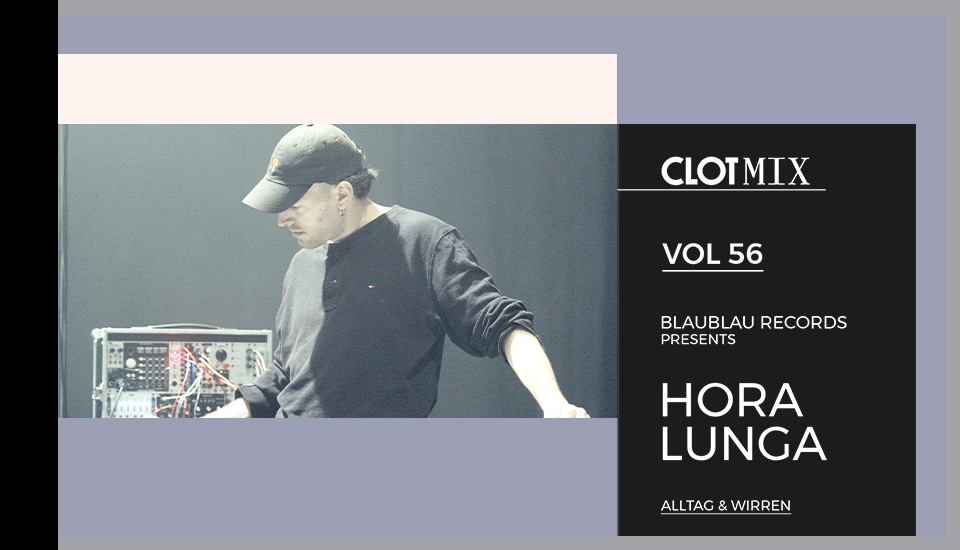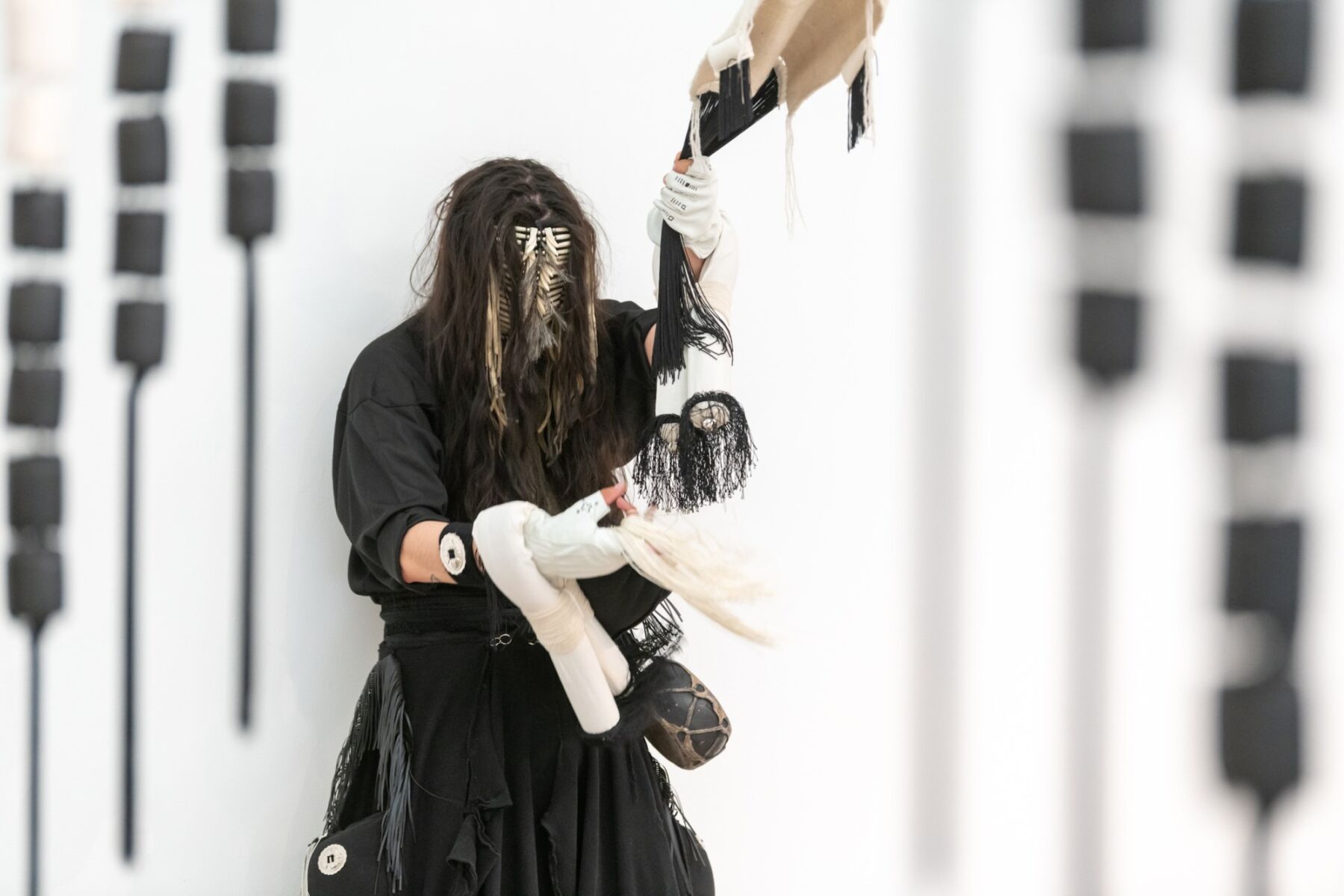Text by CLOT Magazine

Our latest mixtape comes from Hora Lunga, a composer, sound designer, and songwriter based in Zurich. With a passion for pushing the boundaries of electronic music, Hora Lunga creates a unique blend of traditional and experimental sounds that take listeners on a soulful journey.
Having studied electroacoustic composition, the artist’s practice focuses on extended instrumental techniques and improvisation. However, his versatile profile has taken him from pop music productions to experimental works and sound art in recent years. David, who is Hora Lunga, co-runs the Swiss music label BlauBlau Records, which is also an artist collective.
Hora Lunga’s latest release, WIRREN (BlauBlau Records, 2022), is the product of a collaborative artist residency at Dampfzentrale Berne & Südpol Lucerne and premiered at Gessnerallee Zurich. Otherworldly drones and chamber music, feverish free jazz, and serene soundscapes provided by a vast ensemble make it an ode to shared improvisational sessions.
WIRREN is passionately described as chamber music for anarchists and social media addicts, sleepwalkers and day thieves, social romantics, and post-structuralists; for those who are drowning in everyday life, for the superstitious and control-obsessed; for everyone who can read a map and for everyone who can’t read a map. The music reflects this, with each track taking the listener on a journey through a range of moods, from introspective and contemplative to more joyous territories. Hora Lunga weaves together a tapestry of sound that speaks deeply.
In this mix, Hora Lunga draws inspiration from their latest album, infusing it with their signature style of weaving together a diverse palette of sounds. With acute attention to detail, Hora Lunga creates a sonic landscape that explores the depths of emotion and expression.
WIRREN, you describe, is chamber music for anarchists and social media addicts, sleepwalkers and day thieves, social romantics and post-structuralists, for those drowning in everyday life, but what is it for you as an artist?
WIRREN is, first and foremost, a body of sound. Of course, for me as a composer, the individuals are enormously important, I maintain a friendly relationship with each member, but musically we are all one united entity, together. And, of course, it is an enormous privilege to be able to write for such a large group and to record and play on stage with such talented people. WIRREN is also the search for a new musical language, which I want to keep developing with the group. Currently, I am very excited to be writing for the group again. I am planning a new piece for the 2023 / 2024 season.
Part of your practice explores extended instrumental techniques and improvisation. What does sustained notes and drone sounds bring to you as a composer and performer? (I always find this kind of music particularly affecting my bodily perception)?
Yes, it has a lot to do with the body. For me, it also draws a parallel to my other love, studio work, where working with drones seems much more common. For the ensemble musicians, who come more from classical music, it was also a relearning process during the first rehearsals: how can I play a note for fifteen minutes and keep the tension, be part of a bigger whole that is irreplaceably important and yet not push myself to the fore? It’s very difficult, but when you do it together, it’s an almost spiritual experience.
Tell us more about the WIRREN project, a product of a collaborative artist residency at Dampfzentrale Berne & Südpol Lucerne. How did the residency and the inception of the project develop?
I wrote a commissioned composition for a classical orchestra in 2018. That was a good collaboration, and I wanted to write again for a large group. I am very sensitive to the energy and dynamic of a project, and it is enormously important to me that a group not only works together professionally but also develops a human flow. That’s why I put together a group of people, some of whom I’ve been playing with for a long time, and some of whom I’ve wanted to play with for a long time. And it worked: in the end, we didn’t have the feeling of a project, but of a band.
What was your creative process like during the residency? Did it change from your usual one?
We had two residencies, and the majority of this time was spent getting to know the sound of each person better, and understanding how our interplay might develop. It was actually predicated on a collection of material. We still played a gig each time, but what really mattered was that I took home raw material for inspiration. Like samples. I didn’t record anything, but I pretty much knew who was playing what and then used that to write the piece, which we then rehearsed for 10 days and performed at Gessnerallee. The residencies felt like feeling each other out, getting to know each other. The development of the performance at the Gessnerallee was then a translation of everything we had learned into a final rendition.
On a more technical level, what did you want to explore with it?
I really set myself the challenge of building a body of sound which moves very organically, where there are no soloists. Again, this has to do with my work as an electroacoustic composer. Working with effects, how synths work and how I work with space in the studio: all parameters I have translated to WIRREN as a whole. If you want a simple analogy: WIRREN is like a big machine, everything influences each other, and everything reacts to each other. There are several sound sources and several reflections, and the audience is also part of it.
I talked a lot about this with the group, in order to suppress classical improvisational behaviour and to develop a language of our own.
You are based in Switzerland, where you run several events and nights. What have you been most excited about from the Swiss experimental scene recently?
The Swiss scene is growing, but slowly and still quite isolated internationally. Unfortunately. Switzerland is a privileged country, and the urgency to communicate is not as strong as in other countries. But in the last few years, wonderful records have come out. Releases by VÍZ and Junge Eko, for example. Incredibly strong works. And YC-CY, Noémi Büchi, Lorraine92, S.G.A.T.V. – there’s a lot of good Swiss music, but the good stuff is often pretty un-Swiss.
You also co-run BlauBlau Records. What is your approach to running an experimental music record label? And what have been the biggest challenges you’ve faced?
We are a group of, depending on the project, four to seven people, and we don’t only specialize in experimental music. We have grown very organically, we work a lot, and we work hard, but we don’t force anything; we go with the joy and flow of things. A standout project for all of us was the What We Talk About When We Talk About Love series, where we released 13 small runs of vinyl in 13 months by 13 artists and made them available as a subscription. I love every single record in the series, and it’s an incredible body of work.
What is your relationship with technology and analogue tools for your music productions?
I am a digital native through and through, so my basis of thinking is very often shaped by my digital learning.
But I use analogue more and more these days, recording with instruments and musician friends for most of my work.
I don’t have a big outboard, so when it comes to the production process, I work mainly digitally, sometimes with analogue effects and synths, of course. But I have fewer of those tools than most studios.
And how do you cope with technology (screen/digital) overload?
Badly. I’ve been thinking about buying another phone and having a second number for years so that work and private matters don’t always overlap so much on the phone I currently have. But that has more to do with my work as a promoter. In the studio, I think it works best, in the sense that at least I forget my phone while producing. But, yeah, I still sit in front of a screen.





